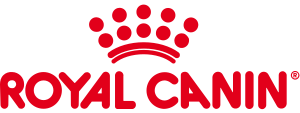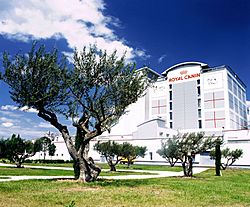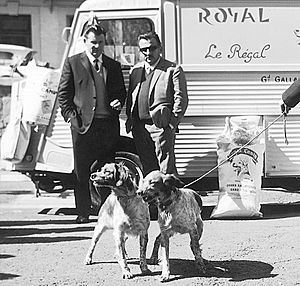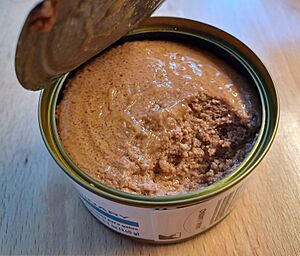Royal Canin facts for kids
 |
|

Royal Canin factory in Aimargues
|
|
| Subsidiary | |
| Industry | Pet food |
| Founded | 1968 Gard, France |
| Headquarters | Aimargues, Gard, France |
|
Area served
|
Worldwide |
|
Key people
|
Cécile Coutens (CEO) |
| Products | Dog food and cat food, animal health products, veterinary products |
| Parent | Mars, Incorporated |
Royal Canin is a French company that makes and sells food for cats and dogs all over the world. It is part of a bigger company called Mars, Incorporated. Royal Canin does a lot of research to understand the special food needs of different dogs and cats.
The company was started by a French vet named Jean Cathary in 1968. He noticed that many pets had skin and coat problems. He believed this was because of their diet. So, he created a special cereal-based food in his garage. This food helped the pets get better.
He realized how important good nutrition was for pets' health. Royal Canin was the first company in France to make dry pet food. They used a special machine called an extruder from the United States. At first, they mainly sold their food to pet breeders. Over time, they grew and started selling their products across Europe.
Royal Canin was sold to the Guyomarc'h Group in 1972. This led to more growth, especially in research. Later, in 1990, Paribas Bank bought the company. Royal Canin was then listed on the French stock exchange. In 2002, Mars, Incorporated bought Royal Canin, and it was no longer listed on the stock exchange.
Contents
How Royal Canin Started and Grew
The Beginning of Royal Canin
Jean Cathary, a French vet, started Royal Canin in 1968. He had a vet clinic in a village in France. He saw many pets with health issues, especially problems with their skin and fur. He thought their food was the cause. So, he made a special cereal-based recipe in his garage oven.
This new food helped the pets' problems go away. In 1968, Cathary officially named his food "Royal Canin." He stopped working as a vet to focus on making and selling the food. He brought an extruder machine from the U.S. This made Royal Canin the first company in France to produce dry pet food. They were also the first European company to use an extruder. They advertised their product on TV, mainly to breeders and dog clubs.
Production quickly increased. In 1970, the company became "Royal Canin S. A.." They opened a bigger factory in Aimargues, France, and started selling products across Europe. They had 40 employees and made 5,500 tons of food each year. They also opened a branch in Spain called Royal Canin Iberica.
In March 1972, Jean Cathary sold Royal Canin to the Guyomarc'h Group. This was a much larger family business that made animal feed. With this new owner, Royal Canin grew even more, especially in research and development. A second factory opened in Cambrai, France, in 1975.
Growing and Changing Owners
Under the Guyomarc'h Group, Royal Canin expanded a lot. They opened a special research center in Saint-Nolff, France, in 1973. Over the next ten years, they opened more branches in other European countries like Italy, Sweden, and Germany. Another factory was built in northern France to serve these new markets. From 1982, Royal Canin started making other products, like canned food and bird seed. Their production grew four times larger in just 10 years.
In 1990, Paribas Bank bought the Guyomarc'h group of companies. Royal Canin had some financial difficulties in 1993. The next year, the Guyomarc'h group was split into four separate businesses, with Royal Canin being one of them. In 1994, a new CEO was chosen. He focused on three main things: dry food, health through nutrition, and knowing a lot about dogs.
The bank wanted to sell Royal Canin. But the company's chairman convinced them to list it on the Paris stock exchange instead. This happened in 1997. Selling part of the company on the stock market helped Royal Canin raise a lot of money. This money helped them buy other pet food brands like Crown Pet Foods in 1999 and James Wellbeloved in 2000.
Royal Canin Today
In July 2002, Paribas Bank sold its share of Royal Canin to Mars, Incorporated. This was a very large sale. The European Commission (a group that checks if big company sales are fair) agreed to the takeover by Mars. But only if Royal Canin sold some of its assets to a Spanish company called Agrolimen. After Mars took over, Royal Canin was removed from the stock exchange.
In 2004, Royal Canin bought some special vet-grade food brands in the US and Canada. These brands were IVD, Medi–Cal, and Techni–Cal.
Royal Canin was one of many brands affected by the 2007 pet food recalls. However, since then, there have been no major safety recalls reported for Royal Canin products.
In 2012, Royal Canin built a large storage and distribution center in Verdun, France. In 2018, Royal Canin celebrated its 50th birthday! In 2021, Mars announced it would invest a lot of money in France. A big part of this investment was for Royal Canin's main office and research center in Aimargues.
Royal Canin Products and Services
Royal Canin makes about 260 different types of pet food. They say their food is made for each animal's body, how sensitive they are, and their exact needs. The main idea behind Royal Canin is 'the health of animals through good nutrition'.
Pet Food Products
Royal Canin is a member of the Pet Food Manufacturers Association (PFMA) in the UK. Their products are made for different ways animals digest food and for different growth stages.
- Dog products: They make dry dog food and wet dog food in pouches.
- Cat products: They make wet cat food in sauce or gravy, and dry cat food.
Special Veterinary Food
The company also creates special diet foods for medical reasons. For example, they have food for cats with urinary problems. They also make food for dogs with allergies or tummy issues.
Some of these special vet foods need a prescription from a vet. An example is their Wet Diet brand. In 2023, Royal Canin added more types of hypoallergenic food. They also launched Dental Care products, which are kibbles with a special texture to help clean teeth.
Other Veterinary Products
Royal Canin also makes products like Pill Assist. This is a treat designed to help pet owners give medicine to their cats by hiding tablets and capsules. In some countries, Royal Canin has its own special channel for vets.
Books and Publications
Royal Canin works with experts to create books. These include the Dog's Encyclopedia, the Royal Canin Cat Encyclopedia, and other books about pet nutrition. They also work with the French Veterinary Academia.
Research and Science
Royal Canin bases its food production on scientific research. They opened their first research center in France in 1973. Later, they opened more research centers in the U.S. and Brazil. They test their products carefully on about 500 pets (dogs and cats). These pets are chosen based on their breed characteristics.
One of the first scientists at their French research center was Daniel Cloche. He was a pioneer in studying bone problems in dogs. Research showed that bone issues in large dogs could be related to their diet. So, Royal Canin developed different recipes to help with this. In 1980, they launched a new food called AGR, especially for large breed puppies. Around that time, they also started making cat foods for specific dietary needs.
In the 1990s, Henri Lagarde was the chairman of the company. He made sure Royal Canin focused on three main things: 1. Studying the bodies and biology of pets to learn more. 2. Making sure all products met specific needs. 3. Treating animals and their food needs with "knowledge and respect," not like humans.
The company's main idea became "knowledge and respect."
Scientific Journals and Studies
With the help of university experts, Royal Canin also publishes encyclopedias about dog and cat breeds. These books have been translated into many languages. They also have books on breeding and nutrition for breeders and vets. Royal Canin used to publish a scientific magazine called FOCUS. It was sent to over 70,000 vets worldwide. Now, it's called Veterinary Focus magazine.
In 2012, Royal Canin did a study. It found that dogs and cats were living longer over the past ten years. This was partly due to better vet care and improved animal food.
Working with Experts and Supporting Events
Specialists and Partnerships
In 1994, Henri Lagarde wanted the company to be known for working with "specialists." He made sure the word "traditional" was removed from all company documents. Instead, they used the word "specialist."
Royal Canin has teams of trained vet technicians. They help and advise breeders and other pet professionals. The company even created a new name for its sales teams: "cynotechnicians." These people were already very knowledgeable and passionate about dogs. Some were even dog show judges or famous breeders.
In 2019, Royal Canin partnered with Massey University Foundation. They offered a scholarship for vet science students studying health nutrition for cats and dogs.
Sponsorships and Support
Royal Canin sponsors and takes part in thousands of cat and dog shows every year around the world. This includes local and regional Canine Clubs.
In 2013, Four Paws, an international animal welfare group, said that Royal Canin was sponsoring events that included illegal bear-baiting in Ukraine. Royal Canin confirmed this was true. They promised to stop sponsoring such events. After that, the company committed to helping rescue bears that had been used in these activities. They also started talks with Four Paws to plan a rescue project. In July, Royal Canin announced they would pay for a rescue center for bears.
In 2022, Royal Canin partnered with PDSA, a UK vet charity. They worked together to help pets with obesity. In the same year, Royal Canin and RACE Foundation continued their work on keeping animals safe and well during travel.
In 2023, Royal Canin sponsored the Cat Friendly Programme in Brazil. This project helps vets make their clinics more comfortable for cats. In August 2023, Royal Canin also made an agreement with AKUT Search and Rescue Association. They will provide food for AKUT's search dogs.
Royal Canin Factories Around the World
Royal Canin's main office is in Aimargues, France. They have 16 factories around the world. Besides Aimargues, some other locations include Cambrai in France, Johannesburg, South Africa, Descalvado, Brazil, and González Catán, Argentina.
The factory in Rolla, Missouri, USA, only makes dry pet food. In 2005, Royal Canin was fined for breaking environmental rules at this site.
In 2004, a factory opened in Dmitrov, near Moscow, Russia. Royal Canin invested a lot of money in building this factory. They expected to make 22,000 tons of food there each year.
In 2006, the Polish government announced a new factory would be built in Niepołomice, Poland. This factory was described as the "ninth and most modern" of all their factories because it would include a special laboratory.
Royal Canin's first factory in the UK opened in December 2007, near Bristol. It was expected to make 2,000 tons of food each year and employ 80 people. Some local people had concerns about the factory. After production started, the Environment Agency received complaints about a strong smell. The company spent a lot of money to install special filters and fix the problem.
In 2008, the company invested a lot of money to build a factory in Guelph, Ontario, Canada.
A factory in North Sioux City, South Dakota, USA, was bought by Mars in 2007. It first operated under the Mars Petcare brand. In 2011, it was rebranded to Royal Canin and now makes wet pet food.
Royal Canin's twelfth factory was completed in 2009 in Shanghai, China. A new plant also opened in 2017 in South Korea.
In 2021, the company announced big investments to expand its factories in North Sioux City, South Dakota, and Lebanon, Tennessee, in the USA. These projects aimed to create many new jobs.
Company Information
Leadership
Since July 2022, Cécile Coutens has been the new president of Royal Canin. She is the first woman to lead the company.
Past Leaders
- 1972-1994: René Gillain
- 1994-2004: Henri Lagarde
- 2004-2007: Alain Guillemin
- 2007-2014: Jean-Christophe Flatin
- 2014-2022: Loïc Moutault
- 2022–present: Cécile Coutens
Royal Canin Foundation
The Royal Canin Foundation was started in 2020. Its goal is to show how pets can help people's health and well-being. They work on topics like pets helping to detect diseases, or training assistance dogs for children with autism spectrum disorders. For example, the foundation works with Dogpoint in Spain to help children with autism get assistance dogs. In France, they support a project to provide more assistance dogs each year. In Mexico, the Foundation uses a team of assistant dogs called BREC K-9 to help during natural disasters like earthquakes.
Being Environmentally Friendly
In October 2021, Royal Canin announced its goal to become carbon neutral by 2025. This means they want to balance the amount of carbon they release into the air with the amount they remove. They started working towards this in 2022, with some of their products already being certified as carbon-neutral.
Royal Canin plans to do this by:
- Using renewable electricity.
- Getting ingredients that are produced in a sustainable way.
- Reducing waste and recycling more.
- Changing their business to be more climate-friendly.
For any carbon they can't completely remove, they will invest in special projects that remove carbon from the air. Royal Canin checks the carbon footprint of all its raw materials. Around 2020, 72% of Royal Canin's factories around the world were already using renewable electricity.
Events Hosted by Royal Canin
Royal Canin organizes events for the pet industry. These include the Vet Symposium, for vets and vet nurses, and the PRO Experts Forum, for breeders.
In December 2023, Royal Canin started its first international photography competition, the Royal Canin Photography Award (RCPA). This competition celebrates the unique qualities and diversity of cats and dogs through art.
See also
 In Spanish: Royal Canin para niños
In Spanish: Royal Canin para niños



